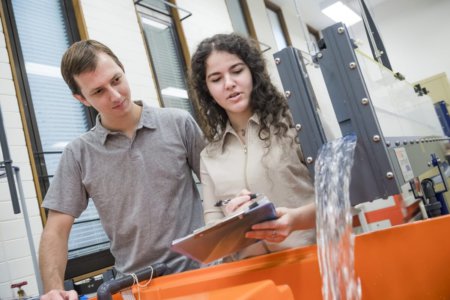
Data Science has been hailed as the “sexiest job of the 21st century” by Harvard Business Review. But what makes Data Science so important?
Whether delivered via autonomous integrated systems or in traditional reports, Information and Data Science have the potential to fuel innovation and transform decision making. Data scientists deal with the challenges of big data – its interpretation, management and use – in fields as diverse as marketing, information systems, engineering, finance, arts, humanities, science and medicine.
Data Science is also the electricity that powers the industries of today. Industries need data to improve their performance, make their business grow and provide better products to their customers. In an age of increasing technological advancements the synergy between science and IT will only become stronger. IT underpins virtually all areas of science and the world needs graduates who can straddle both.
Here are four universities that provide the skills and knowledge to achieve just that:
Syracuse University

Make an impact on any industry with iSchool’s Applied Data Science Master’s Degree. Source: Syracuse University
Syracuse University’s School of Information Studies is expanding human capabilities by connecting people, information, and technology. How is this achieved? Through a range of interdisciplinary, innovation-driven undergraduate, master’s, doctoral, certificate and online programmes at the intersection of technology, business, and data.
The School of Information Studies’ Applied Data Science Master’s Degree is designed for future leaders from all academic and professional backgrounds who want to apply data science, information technology and management expertise to their chosen profession. Whether you are interested in finance, healthcare, marketing, government or sports, the Applied Data Science program will give you the skills and experience to solve problems using data and technology. The School of Information Studies has taught Data Science for over a decade and consistently updates its curriculum to teach students the cutting-edge data science techniques and topics that are in-demand from employers across all industries and sectors.
In this highly technical and interdisciplinary programme, you’ll learn how to collect and organise data; develop programming skills in R, Python and SQL; understand Machine Learning/Artificial Intelligence/Deep Learning; identify patterns via visualisation, statistical analysis, and data mining; develop business actions plans; communicate with managers, IT figures, programmers, statisticians, and other relevant professionals; and more. Students will also engage with the big questions about data accuracy, privacy, equality, and ethics with deep analytical, technical, communication and management skills. Students can choose to specialize in emerging specialties within the field including Data and Business Analytics; Language Analytics; and Data Pipelines and Platforms.
Experiential learning is at the core of a Syracuse education. The school’s new Career Services and Experiential Learning Department provides career exploration and guidance workshops, offers real-world project-based client experience, guides students through professional certifications, sponsors visits with the leaders of the field, and directs formal internships in all the professional domains.
University of Oregon

Oregon’s Department of Computer and Information Science is devoted to the advancement of computer and data sciences. Source: University of Oregon
The University of Oregon is renowned for its research prowess and commitment to teaching. Located conveniently in the lush Willamette Valley, it’s an easy drive to both the Pacific Ocean and the Cascade Mountains.
Oregon’s Department of Computer and Information Science is devoted to the advancement of computer and data sciences. We know what’s possible when the world’s greatest minds are empowered to push the boundaries of technology. Here, students get to see this in action.
From the development of time-critical software for aerospace applications to the design of graphics and animation software to the implementation and testing of next-generation Internet protocols, the Master of Science degree programme prepares you for it all. By enhancing the student’s knowledge of their chosen field of study through advanced coursework units and extensive, independent research, this programme opens up a range of possible career opportunities.
For those with a comprehensive understanding of computer science and an ability to do creative research, the PhD offers a chance to work with international leaders in their fields of expertise. Their research areas cover the areas of informatics, computational science and scientific visualization, networking and security, programming languages and software engineering, HCI, and theory.
The department’s research and teaching activities focus on Big Data; artificial intelligence; cognitive modeling; algorithm design and application; machine learning and so forth. Students learn from designated centres and institutes including the Centre for Big Learning; Centre for Cyber Security and Privacy; Center for Digital Mental Health; The Neuroinformatics Center; and Oregon Advanced Computing Institute for Science and Society.
University of Arizona

Get the skills you need to thrive in today’s information-savvy workforce from the University of Arizona. Source: University of Arizona
If you want to explore the intersections of people, data, and technology then the University of Arizona’s School of Information is the place to be. The iSchool is a research-rich, business-focused, professional department with a global reputation for academic excellence. This is where experts, academics and students are working together to create a more diverse, equitable, and inclusive future through information.
To train the information professionals of tomorrow, the school offers six academic programmes along with a number of certificates. Students can choose from specialisations in information management; data analysis; artificial intelligence; librarianship; social media marketing; and many more.
To develop a skillset in high demand, choose the Bachelor of Information Technology and Science programme. This could be anything from designing a stunning visualisation of scientific data to building an app for fieldwork data collection, from setting up business IT processes to delivering a scientific product via the internet.
As the programme is hands-on, students participate in internships and develop valuable contacts with local and national companies, such as Hydrant, Octavia Digital Media, and the Enterprise Technology division of State Farm.
University of Texas at Dallas

STEM-designed programmes give you the necessary technological tools and a competitive advantage, preparing you for the workforce. Source: University of Texas at Dallas
Outstanding tuition value. A wide variety of classes on campus and online. Flexible scheduling. A convenient location. These are the features of the Naveen Jindal School of Management at the University of Texas at Dallas. The school has one mission: to meet the challenges of a rapidly changing, technology-driven, global society by partnering with the business community.
With programmes offered at the bachelor’s, master’s, PhD and Executive levels, there is something for everyone. Students benefit from a choice of six areas of business specialisation: Accounting; Finance and Managerial Economics; Information Systems; Marketing; Operations Management; and Organisations, Strategy and International Management.
If you’re looking to step foot into the world of Information Systems or step up the corporate ladder, you can take your pick from the following options: Bachelor’s in Information Technology and Systems; Master’s in Business Analytics; Master’s in Information Technology and Management; and PhD Concentration in Information Systems.
Through these degrees, you’ll dive deeper into core analytics concepts covering descriptive, prescriptive and predictive analytics, and modules covering tools like SAS, R, Python, Hadoop, Stata and Tableau. These STEM-designed programmes give you the necessary technological tools and a competitive advantage, preparing you for the workforce of today and tomorrow.
*Some of the institutions featured in this article are commercial partners of Study International










